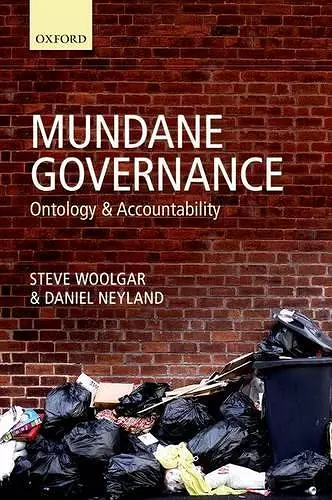Mundane Governance
Ontology and Accountability
Daniel Neyland author Steve Woolgar author
Format:Hardback
Publisher:Oxford University Press
Published:28th Nov '13
Currently unavailable, and unfortunately no date known when it will be back
This hardback is available in another edition too:
- Paperback£42.99(9780198864448)

What is to be made of the outcry when newly issued recycling "wheelie" bins are discovered to contain microchips for weighing and evaluating householders' rubbish? The angry accusations that speed cameras are generating excessive income for the government? The consternation at the measures taken by airports to heighten security in the wake of the increased threat of terrorist attacks? These increasingly widespread reactions to ordinary events and everyday phenomena share a common theme. They all embody concerns about the ways in which our lives are increasingly regulated and controlled in relation to ordinary objects and technologies. This book takes these concerns as the starting point for exploring the ways in which relations of governance and accountability in contemporary life are organized around ordinary, everyday, pervasive objects and technologies. In contrast to the contemporary literature on governance, the book argues for the importance of examining how accountability relations are enacted on the ground, in relation to mundane objects and technologies. In particular, it is crucial to understand how governance and accountability are mediated through material relations involving ordinary everyday objects and technologies. The book argues that the key to understanding governance is to focus on political constitution at the level of ontology rather than just on the traditional politics of organization, structure, and human compliance. The term ontology is used here to draw attention to the social and cultural processes whereby the nature and existence of ordinary things come to matter. The argument is developed in relation to a wide variety of empirical materials drawn from three main areas of everyday life: waste management and recycling; the regulation and control of traffic (especially speed cameras and parking); and security and passenger movement in airports.
Do you want to escape from the rulers who hide in the mundane tools of daily life? Then read this book to find out how it all works. Governance in practice provocatively portrayed. Annemarie Mol, University of Amsterdam After this book, sorting your trash, slowing down to negotiate a speed hump, and transiting through an airport will become intensely social events. Mundane objects will have become your familiars in new ways. Essential reading for new generation science and technology studies. Helen Verran, University of Melbourne This is a book to spark a whole field of research. With droll wit and exquisite prose, Woolgar and Neyland demonstrate that understanding the infrastructures of everyday governance (recycling, speed cameras, airport security) requires new ways of exploring the kinds of objects that make up our world (our sociotechnical ontologies) and the very nature of the state. It is at once a science and technology studies classic and a gage for the continued fertility of the field. Geoffrey C. Bowker, University of California, Irvine
ISBN: 9780199584741
Dimensions: 239mm x 162mm x 26mm
Weight: 604g
296 pages